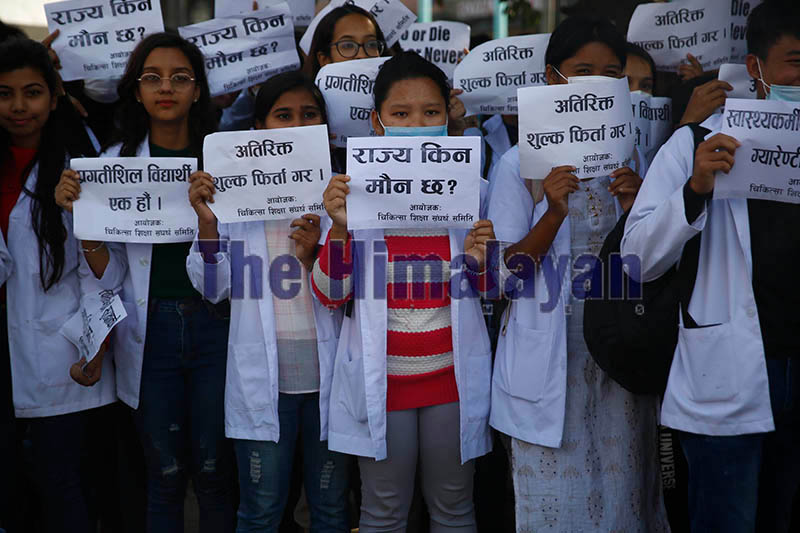Editorial: Return the extra fees
The medical colleges would do well to refrain from issuing threats of shutting them down to pile pressure on the government
The private medical colleges have been given a 15-day ultimatum to return extra fees charged from the students, and it would be in their interest to heed the government warning. At a press meet the other day, Minister of Education, Science and Technology Giriraj Mani Pokharel sounded tough and said a fraud case would be filed against those medical colleges failing to return the extra money taken from the students within the stipulated time.
The government has the backing of both the students and their parents, and if need be the public at large, in trying to put a cap on the fee medical colleges can charge from students. A Cabinet meeting last year had capped the fees for the MBBS undergraduate course at Rs 3.85 million in the Kathmandu Valley and Rs 4.24 million outside. However, colleges have been charging an extra Rs 0.5-2 million under different headings.
For this fiscal, the fees for the MBBS course has been revised to Rs 4.02 million for Nepali students in Kathmandu’s medical colleges and to Rs 4.44 million for colleges outside the capital. The medical colleges have, however, been objecting to this provision and demanding they be allowed to charge more and also admit more students in both medicine and dental faculties.
Medical education is very expensive in Nepal, as it has become big business rather than being service-oriented. True, a medical college requires an investment running into billions of rupees, as one of the pre-requisites is a well-equipped teaching hospital. But then, despite the denial, the colleges are making hefty profits, some running into even billions, year after year, all at the expense of the students. The medical colleges were having a field day fleecing the students, until a crusader, Dr Govinda KC, formerly with the Tribhuvan University Teaching Hospital (TUTH), staged multiple hunger strikes lasting weeks over the years to end the anomalies and irregularities existing in the medical sector.
Among his many demands include a cap on medical education and allocating 75 per cent seats in the government-owned medical colleges and 20 per cent in private colleges for full scholarships to benefit financially-weak students. He retired from TUTH only recently and is into his 17th hunger strike in Dadeldhura in far west Nepal, demanding the fulfillment of the past agreements reached with the government.
The medical colleges would do well to refrain from issuing threats of shutting them down to pile pressure on the government. They must abide by the Medical Education Act and the decision of the Cabinet. Failure to do so will only invite problems in the form of government action and student protests. From the fees the government has allowed them to charge students, the medical colleges can still make handsome profits. Their focus should be on quality education not business. Graduates of private medical colleges have fared poorly in the license exams conducted by the Nepal Medical Council, with some colleges showing zero outcome. It is time the anomalies and irregularities in the medical education sector were ended once and for all. The government must deal with them sternly to do justice to both Dr Govinda KC and the students.
Project compensation
Compensation for the land acquired for the development of the much-hyped 1,200-MW Budhigandaki Hydropower Project has come to near completion. According to Krishna Karki, project chief of the Rehabilitation and Resettlement Unit Office, as much as Rs 27.8 billion has already been distributed to individuals in Gorkha and Dhading districts, whose land has been acquired for the project. A total of 44,000 ropanies of land have been acquired for the development of the national pride project, which has been awarded to a Chinese company under direct negotiation.
But Karki said the compensation for Arughat in Gorkha and Aarkhet and Khahare Bazaar area in Dhading has yet to be determined. Most of the people who have not received the compensation did not have land ownership certificates though their names have been recorded in the field book. The project will displace 20,146 households from the then 27 VDCs and another 25,000 people will be indirectly affected by the project. The government has so far collected more than Rs 37 billion in ‘infrastructure tax’ on the sale of petroleum products at the customs points for the project’s development. But there is no sign when the Chinese firm will actually start construction.






